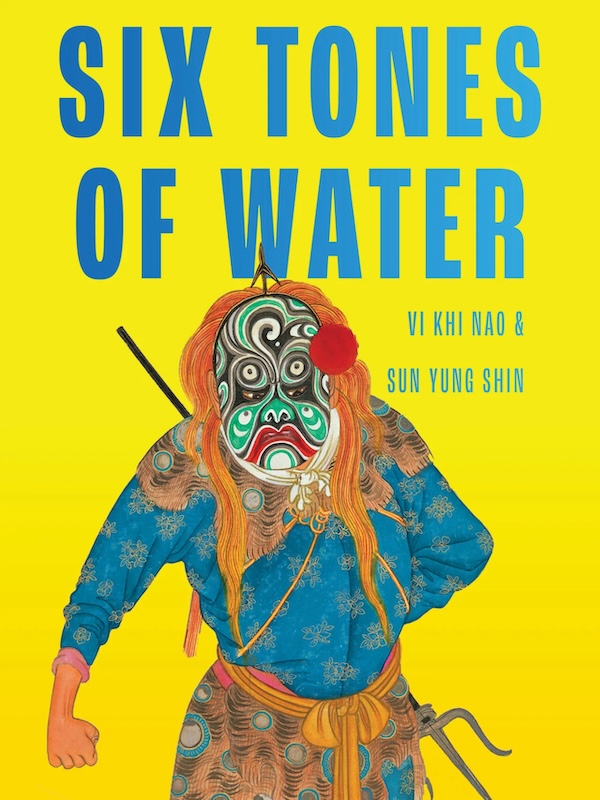
SIX TONES OF WATER
by Vi Khi Nao & Sun Yung Shin
Six Tones of Water is an experimental, collaborative poetry manuscript co-written in real time in one document. Word play, translations, and other chimerical births and rebirths of language ride the waves of spontaneous, even divinatory writing, as the borders and blurriness of consciousness make marks on the page. Language’s opacities and transparencies and un-translatabilities create a sort of stickiness, in the throat, the mind, the body, the text; mutual understanding is attained through asymmetries, gaps, noise, silence, lacunae, and also wonder, sounds, tones, violence, forgetting, memory, and beauty. Here, English, a colonial language, is a medium, a plasma, a fourth state of matter, perhaps. On the page, if not in sociopolitics, life spans, and uneven distributions of suffering, there is a kind of restive quality.
Book design by David Wojciechowski
SIX TONES OF WATER
by Vi Khi Nao & Sun Yung Shin

Six Tones of Water is an experimental, collaborative poetry manuscript co-written in real time in one document. Word play, translations, and other chimerical births and rebirths of language ride the waves of spontaneous, even divinatory writing, as the borders and blurriness of consciousness make marks on the page. Language’s opacities and transparencies and un-translatabilities create a sort of stickiness, in the throat, the mind, the body, the text; mutual understanding is attained through asymmetries, gaps, noise, silence, lacunae, and also wonder, sounds, tones, violence, forgetting, memory, and beauty. Here, English, a colonial language, is a medium, a plasma, a fourth state of matter, perhaps. On the page, if not in sociopolitics, life spans, and uneven distributions of suffering, there is a kind of restive quality.
ISBN 978-1-938900-54-9
Publication Date: August 2024
Perfect-bound, 106 pages, 7″x9″
PRESS + MEDIA
In this exhilarating book, VI KHI NAO & SUN YUNG SHIN, two masters of their craft, take complete control of three languages and turn them inside out and weave them into a tapestry depicting the beauty, the limitation & the absurdity of each and all of them. And in doing so, it is as if they’ve invented a new language altogether in Six Tones of Water, one that will serve them and not the other way around. As a reader, I felt liberated. This book and these two poets reminded me I don’t have to stop where language tells me to stop. I can simply fly over it.
– Chiwan Choi
What does it mean to be both inside and outside a language? Three languages? Vi Khi Nao and Sun Yung Shin, in Six Tones of Water 물의여섯소리, mul-eui yeoseot sori, SÁU ÂM VANG CỦA NƯỚC, a poetic conversation written in real time, blur the bodies of the two poets and the materiality of Vietnamese, Korean, and English languages. This book is an immigrant’s, an adoptee’s, a postcolonial subject’s ecotone of metamorphic Weltanschauungen that move like “Translucent ghosts [following the speakers’] shadows home from a temple.” This coming together of poets in conversation shifts like tectonic plates: pushing language up into mountian-like peaks and creating vast rifts to be filled with the reader’s own waters. A book, this one here, is a raft to ride to the other shore of decolonial meaning.
– Rajiv Mohabir
When I say this book left me speechless, I mean it left me speechless. I had to collect language from some ruin afterward to speak about it. Six Tones of Water takes up simultaneous saturation and absence, maps of the past, familial tethers, that is: longing. Language here, fades away, and then rushes toward us like a tide, arrives again and again. Where one begins and another begins/there is no ending. Here, histories and desires are knotted: Mother, it’s September already/Even though it is only June. In varied fonts, alphabets, in lists and fragments, poets Vi Khi Nao and Sun Yung Shin deliver a correspondence of geography, memory and a sensory universe. The sound of it, a tone in a hidden register, to echo long after.
– Rocío Carlos
